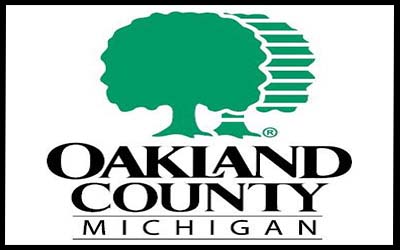


COVID-19 Update On Vaccine Clinics And Doses
Oakland County Health Division COVID-19 Update On Vaccine Clinics And Doses For The Week Of June 1 – 7
Pontiac, Michigan – Oakland County Health Division will host 11 COVID-19 vaccine clinics from Tuesday, June 1 – Monday, June 7 in the following communities: Auburn Hills, Farmington Hills, Oak Park, Ortonville, Pontiac, Rochester, Southfield, Waterford, and West Bloomfield. These clinics accept both appointments and walk-ups. Click on OaklandCountyVaccine.com for clinic locations and times.
Continuing its focus on community and school-based clinics, Health Division will also host vaccine clinics in Southeast Oakland County the week of June 7. There will be community-based clinics in Brandon, Groveland, Rose, and Springfield Townships the week of June 14. Finally, the South Lyon/Lyon Township area the week of June 21. Monitor OaklandCountyVaccine.com for these upcoming clinic locations and times. Those who do not have access to a computer or the Internet may call the Nurse on Call at 800-848-5533 for more information.
Oakland County is also partnering with Oakland Schools to provide COVID-19 vaccine support to school districts. Parents and guardians will be able to bring their school-age children 12 and older to clinics hosted in each quadrant of the county. There will be free COVID-19 vaccine clinics in the following school districts for students and families in their surrounding areas by appointment and walk-up on the following days:
- West Bloomfield Middle School, 3380 Orchard Lake Rd. in West Bloomfield today from 3-6 p.m.
- Brandon Middle School, 609 S. Ortonville Rd. in Ortonville, on June 3 from 3-7 p.m.
- New: Harrington Hills Elementary School, 541 Bay St. In Pontiac, on June 3 from 4-7 p.m.
- New: Francis Scott Key Elementary School, 23400 Jerome St. in Oak Park, on June 5 from 9 a.m. to noon.
For more details or to register for one of these clinics, go to OaklandCountyVaccine.com. Information on future school-based COVID-19 vaccine clinics will be posted there as superintendents request them.The following is an update on progress vaccinating Oakland County residents, according to the State of Michigan COVID-19 Vaccine Dashboard as of June 1, 2021:
Total eligible residents 16 and older: 1,029,737
- Number of residents 16 and older who have received first dose: 679,539
- Number of residents 16 and older who have completed vaccination: 600,209
- Vaccine coverage for residents 16 and older: 66.0%
Total eligible residents 12 and older: 1,091,389
- Number of residents 12 and older who have received first dose: 698,042
- Number of residents 12 years and older who have completed vaccination: 600,209
- Vaccine coverage for residents 12 and older: 64.0%
Total eligible senior residents 65 and older: 217,676
- Number of senior residents who have received first dose: 179,332
- Number of senior residents who have completed vaccination: 168,604
- Vaccine coverage for senior residents: 82.4%
Total doses distributed within Oakland County: 1,270,955
- Total doses administered within Oakland County: 1,259,618
- Percentage of doses administered within Oakland County: 99.1%
Whitmer Announces New MI Clean Water Grants

Gov. Whitmer Announces New MI Clean Water Grants to Upgrade Water Systems Throughout Michigan LANSING, Mich. – Governor Gretchen Whitmer today announced grants awarded under the umbrella of the MI Clean Water plan to help Michigan communities strengthen drinking water infrastructure and better ensure safe, affordable tap water across the state. More than $5 million in funding will assist state efforts to support local projects that improve drinking water systems including replacing lead service lines, enhancing water affordability plans, and connecting homes with contaminated drinking water wells to safe community water supplies. “Since I first took office, I made it clear that we are going to rebuild Michigan’s crumbling infrastructure from roads to pipes to dams across our state,” said Governor Gretchen Whitmer. “As we put Michigan back to work, we’re excited to provide our local partners with the support that helps us protect Michigan’s water resources from source to tap. Making these investments into our most precious resource allows us to invest directly in public health, help jumpstart our economy, and protect the environment.” The MI Clean Water plan is a historic, $500 million investment announced by Gov. Gretchen Whitmer in October to rebuild the state’s water infrastructure and help provide clean, affordable water to Michiganders through investments in communities. This work has bipartisan and bicameral partners. The MI Clean Water plan marks a significant investment after decades of underinvestment in Michigan’s infrastructure. Taken together, the $500M confronts the large infrastructure issues that Michigan faces such as lead-laden water service lines, toxic contamination like per- and polyfluoroalkyl substances (PFAS), undersized sewers, failing septic systems, unaffordable water rates and constrained local budgets.
This historic investment includes a proposal combining federal dollars for lead service line replacement in low-income communities ($102.1 million) with bonding authority for water quality protection ($290 million), a one-time General Fund appropriation for drinking water infrastructure and innovation ($105 million), and asset management grants ($2.9 million) to help communities develop, update and improve their plans for wastewater and stormwater.
In addition to drinking water investments currently being awarded, Whitmer called on the State Legislature to approve MI Clean Water funds for community wastewater treatment improvements that protect Michigan lakes and streams, and to authorize additional investments in water infrastructure that ensure safe drinking water and clean water for swimming, boating, fishing and other activities. When the Legislature acts, it would allow for access to $290 million more dollars to support over 3,000 jobs and finish the commitment of the MI Clean Water plan.
The Drinking Water Asset Management (DWAM) grant is available to assist water supplies in asset management plan development or updates, and/or distribution system materials inventory as defined in Michigan’s Lead and Copper Rule.
The Affordability and Planning Grant (AP) grant is available to any community water supply and local unit of government, including counties, townships, cities, villages and others to assist in planning and/or rate studies.
Recently approved grants awarded through the DWAM and AP programs: DWAM Grants (Cities unless otherwise indicated)
Charter Twp. of Hampton, $499,343 Bronson, $469,400 St. Clair Shores, $473,750 Hartford, $375,000 Charlotte, $350,700 Brown City, $340,000 Sturgis, $283,200 Mason, $274,800 Hillsdale, $241,000 Village of Baldwin, $234,000 Ironwood, $214,913 Hastings, $214,870 Greenville, $203,245 Hamtramck, $188,315 River Rouge, $160,488
AP Grants
Oakland County Water Resources Commissioners Office, $444,600 City of Kalamazoo, $395,600 Ely Township, $17,500 Allendale Charter Township, $15,000 Village of Sheridan, $15,000 City of Springfield, $15,000 City of St. Clair Shores, $7,500 Village of Vermontville, $15,000
Michigan EGLE expects to update new grants and recipients under the Mi Clean Water plan via a press release the first week of every month throughout the summer of 2021. An archive of EGLE press releases is available here. |

Michigan Takes Next Step Back to Normal

FOR IMMEDIATE RELEASE June 1, 2021 Contact: [email protected]
Michigan Takes Next Step Back to Normal under updated Vacc to Normal Plan
LANSING, Mich. – Today, Governor Gretchen Whitmer announced Michigan has reached the next step in the Vacc to Normal plan. As of June 1, capacity limits are lifted for outdoor events and residential gatherings. Additionally, indoor capacity limits will increase to 50%, allowing indoor social gatherings such as weddings and funerals to move closer to normalcy. Face masks will only be required for individuals who are not yet fully vaccinated indoors.
“Because so many Michiganders did their part and stepped up to get vaccinated, we are able to return to normal more quickly,” said Governor Gretchen Whitmer. “Our state is closer and closer to being back to normal. Now, Michiganders may celebrate saf
“This pandemic has been so difficult for so many Michiganders. We’ve made incredible sacrifices for the good of public health and the safety of our friends, family, and communities,” said Lt. Governor Garlin Gilchrist. “This vaccine is helping our small businesses reopen their doors. It’s allowing our economy to come back stronger than ever and allows for a sense of normalcy to return for families across our state. I hope that this news is an added incentive for those on the fence about getting a vaccine. I will remain focused on encouraging every Michigander to make a vaccine appointment if they haven’t already. This is how we move forward, together.” |
Orion Chamber Food Truck Festival on June 4
By on
The Orion Area Chamber of Commerce is holding their very first Food Truck Festival on June 4 from 4:30 p.m. to 8:30 p.m. at the Orion Center.
There will be ten food trucks, a beer garden, live music, kids activities and (limited) Chamber member vendor/exhibiter spots. The event will be free and open to the public.
Participating food trucks include:
The Grilled Wrap
Hole Latte Dough
Motor City Street Treats
Motor City Sweet Treats
Mr. Pit Master BBQ
PizzaPazza
Sabor Latino
Sonny’s Hamburgers
Tacos Te Amo
Treat Dreams
For more information visit www.orionareachamber.com/food-truck-festival. — M.K.

AG Commends Whitmer’s Elder Abuse Awareness Proclamation
|
LANSING – Michigan Attorney General commended Governor Gretchen Whitmer for proclaiming June 2021 as Elder and Vulnerable Adult Abuse Awareness Month. One in ten older adults in the United States experiences abuse, neglect and exploitation. Elder and vulnerable adult abuse often goes unnoticed and unreported. Attorney General Nessel brought together the Elder Abuse Task Force to combat this complex issue. “Older adults are a particularly vulnerable group, making them susceptible to physical abuse, financial exploitation, emotional abuse and/or neglect. In order to properly protect our senior and vulnerable adult population, we must be able to recognize the signs of abuse,” Nessel said. “Our “This month, I am proud to partner with the Attorney General and the Department of Health and Human Services to raise awareness of the abuse of older and vulnerable adults here in Michigan,” said Governor Gretchen Whitmer. “The Elder Abuse Task Force has done terrific work, gathering resources that help identify physical and emotional abuse, neglect, and financial exploitation of older residents. I encourage all Michiganders, regardless of their age, to educate themselves this month on the often ignored or underreported issue of elder abuse.” “MDHHS is pleased that our Adult Protective Services is able to work hand-in-hand with Attorney General Nessel and Gov. Whitmer to address a serious problem that affects Michigan’s aging population and other vulnerable adults,” said MDHHS Director Elizabeth Hertel. “In June and every month, MDHHS is dedicated to protecting vulnerable adults by investigating complaints of abuse, neglect and financial exploitation and taking action.” The Task Force launched in 2019 and consists of more than 55 different organizations in the public, private and nonprofit sections – all working together to combat elder abuse. Most recently, Nessel launched The Sentinel Project – an initiative that focuses on protecting vulnerable adults residing in nursing facilities. This initiative uses specially trained staff to examine long-term care facilities for evidence of abuse or neglect through unannounced visits, which are determined by performance metrics, complaints and other data. If you or someone you know is being abused or neglected in a nursing facility, contact the Michigan Attorney General’s Health Care Fraud Hotline at (800) 24-ABUSE (2-2873) or file a complaint online through the Michigan Attorney General Patient Abuse Complaint Form. For more information on the Elder Abuse Task Force, visit the Task Force’s webpage. To report elder abuse, call 855-444-3911. |

